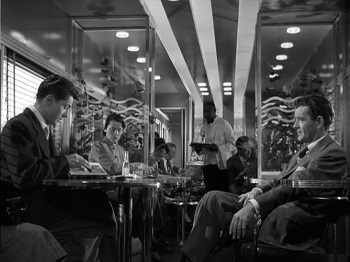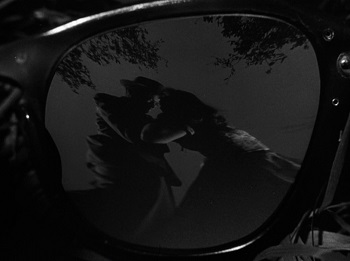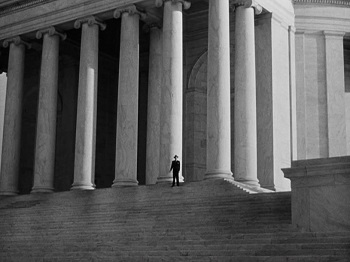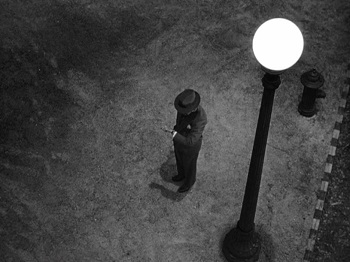"It's so simple, too. A couple of fellows meet accidentally, like you and me. No connection between them at all. Never saw each other before. Each of them has somebody he'd like to get rid of, but he can't murder the person he wants to get rid of. He'll get caught. So they swap murders."
 I'm going to try my hardest to make this shorter and less in-depth than my previous Hitchcock reviews because I feel that with a film like Strangers on a Train, the less said the better. It's the kind of film to walk in knowing only the pretext and just sit back and watch it unfold. Scratch that. I'm going all the way. I'm against clouding my review with spoiler alerts, so just read at your own risk.
I'm going to try my hardest to make this shorter and less in-depth than my previous Hitchcock reviews because I feel that with a film like Strangers on a Train, the less said the better. It's the kind of film to walk in knowing only the pretext and just sit back and watch it unfold. Scratch that. I'm going all the way. I'm against clouding my review with spoiler alerts, so just read at your own risk.
Two men who have never met before and share nothing in common board a train. Well, that's not quite true. They share only one thing in common. Both men have a person in their life that makes them unbearably miserable. The two men are Guy Haines, a famous tennis player and Bruno Anthony, a wealthy nobody. A chance meeting between the two spurs a conversation where they discuss the people in their lives they wish would be killed off so they can finally be content. Guy believes this to be just a harmless conversation. What he doesn't realize is that Bruno is very serious and adamant about this and throughout the story we see just how much thought and dedication he's put into what he considers to be "the perfect murder".
Strangers on a Train I felt shares many similarities to Hitchcock's Rope. The sexual nature in murder by strangulation returns, though what I picked up through revisiting that I had missed previously was the heavy homosexual subtext. From the start of the film Bruno is immediately fixated on Guy and it's even suggested that meeting the celebrity is a dream come true. He continues to beam at Guy like a cat about to pounce on a mouse. These men truly are strangers, yet Bruno seems to know a lot about Guy, much more than the average tennis fan and upon meeting him, literally invades Guy's comfort zone as he engages him in conversation. Sexual themes were very risque for the time and coming back to these films has opened my mind to how sexual Hitchcock was capable of being without it being too raunchy. The scene where Guy's wife is licking an ice cream cone as she stares at Bruno flirtatiously dropped my jaw. The way I see it, there's only two ways a woman licks an ice cream cone: casually and suggestively, and she was not being casual with that cone at all.
Sexual themes were very risque for the time and coming back to these films has opened my mind to how sexual Hitchcock was capable of being without it being too raunchy. The scene where Guy's wife is licking an ice cream cone as she stares at Bruno flirtatiously dropped my jaw. The way I see it, there's only two ways a woman licks an ice cream cone: casually and suggestively, and she was not being casual with that cone at all.
I feel redundant when I go into the performances in Hitchcock films. I feel like I'd be repeating myself so let's get to the standouts. Outside of the leads I found the supporting scene-stealer to be the director's own blood, Patricia Hitchcock as Guy's soon to be sister-in-law. I think it was one of Hitchcock's most deliberate casting choices because her practical nature and dark, morbid sense of humor feels like the closest we would ever come to the director having a supporting role in one of his own films.
Robert Walker plays Bruno Anthony, a man who is disturbingly intrusive and creates discomfort and uneasiness to almost everyone around him. Bruno is the kind of man who has his own style and walks his own walk, which may be why anyone would initially show interest in him. He's the kind of man who you become curious of from afar but the closer you get to him only makes you want to get farther away and if you do manage to get away, then consider yourself lucky. Bruno is by far my favorite Hitchcock villain because of how fascinating he is. It's not just that he is creepy and menacing, but as the film escalates in tension and suspense, we learn more about him without knowing too much. There is never a clear explanation as to why he has such a sinister mind, but we do get a window into his personal life and his subtle yet disturbing relationship with his doting and possibly unstable mother (How Hitchcockian!). While Bruno insists that his father is a terrible person who is the source for all the unhappiness in his life, the viewer learns that his father is in fact a well-intentioned man who is completely aware that something is drastically wrong with his son, which is what spurs their contempt with each other.
While Bruno insists that his father is a terrible person who is the source for all the unhappiness in his life, the viewer learns that his father is in fact a well-intentioned man who is completely aware that something is drastically wrong with his son, which is what spurs their contempt with each other.
Through the relationship with his mother, Bruno is shown to have a very immature and childlike mind, but I find this to deliberately throw the viewer off from just how smart and organized he really is. Bruno stresses through the first third of the film that he is worthless: just an aimless rich kid with no logical understanding of having a passion or a goal, but he doesn't let that bring him down at all. He seems content with that fact. The closest he comes to having passion for something is in his appetite for destruction. Bruno seems to want to cause havoc to anyone and Guy just so happened to have the misfortune of becoming Bruno's newest project. There were times in the film where I found myself wondering whether Bruno cared more about destructively disrupting Guy's life than having his father rubbed out. He doesn't seem to be getting off on his crime in the same way Brandon Shaw does in Rope, but he certainly does seem to be enjoying himself like he is in the middle of playing his favorite kind of game. Bruno is a stalker and stalkers are naturally creepy, yet despite many similar characters we have seen throughout the years in film, no one has since matched up to the levels of disturbing intimidation as Bruno. While his immaturity is fairly obvious, he is still very calculating in his moves and is always one step ahead of everyone else. What makes this one of Hitchcock's best suspense films is the way Bruno methodically slithers into Guy's professional and personal life. Bruno is a twisted man who believes that what he is doing will bring him closer to Guy. He considers Guy a friend, possibly more than that. The sequence when Guy is playing tennis and spots Bruno in the crowd has to be one of the greatest scenes from a suspense film ever that I'm sure has influenced many future directors of the genre. It's quick and simple, yet so effective.
While Hitchcock's films feature many recurring themes, I believe this may be the first film of his to explore doubles (The other being Vertigo). Guy's former wife, Miriam and Patricia Hitchcock's character have many exterior similarities that are so deliberate that it becomes a plot point later on. Instead of going on a single date to the fair, Miriam takes two men. The lighter that recurs throughout the film features two tennis rackets crossed. Even Hitchcock's obligatory cameo features him pulling a cello that resembles him in girth. Then of course, there is the concept of two men switching places to commit two murders. I forgot just how chaotic the climax of this film is. This is not the traditional "Hitchcock twist ending" that the director is most famous for, but the man was a master and he certainly knew exactly how to keep the audience at the edge of their seat and I can promise you that you will be like that for most of the film. While not as philosophical as Rope, the concept of murder and how a person's morals can be twisted to justify the intent is present. The intrigue this time doesn't come from the discussions so much as the suspense and menace created by the most menacing antagonist in Hitchcock's filmography and easily one of the greatest villains of all time. The film is a masterpiece in suspense on its own, but even then it's worth seeing for the kind of hell that is Bruno Anthony.
Guy's former wife, Miriam and Patricia Hitchcock's character have many exterior similarities that are so deliberate that it becomes a plot point later on. Instead of going on a single date to the fair, Miriam takes two men. The lighter that recurs throughout the film features two tennis rackets crossed. Even Hitchcock's obligatory cameo features him pulling a cello that resembles him in girth. Then of course, there is the concept of two men switching places to commit two murders. I forgot just how chaotic the climax of this film is. This is not the traditional "Hitchcock twist ending" that the director is most famous for, but the man was a master and he certainly knew exactly how to keep the audience at the edge of their seat and I can promise you that you will be like that for most of the film. While not as philosophical as Rope, the concept of murder and how a person's morals can be twisted to justify the intent is present. The intrigue this time doesn't come from the discussions so much as the suspense and menace created by the most menacing antagonist in Hitchcock's filmography and easily one of the greatest villains of all time. The film is a masterpiece in suspense on its own, but even then it's worth seeing for the kind of hell that is Bruno Anthony.
Please feel free to discuss "Strangers on a Train" here, in our forums!

